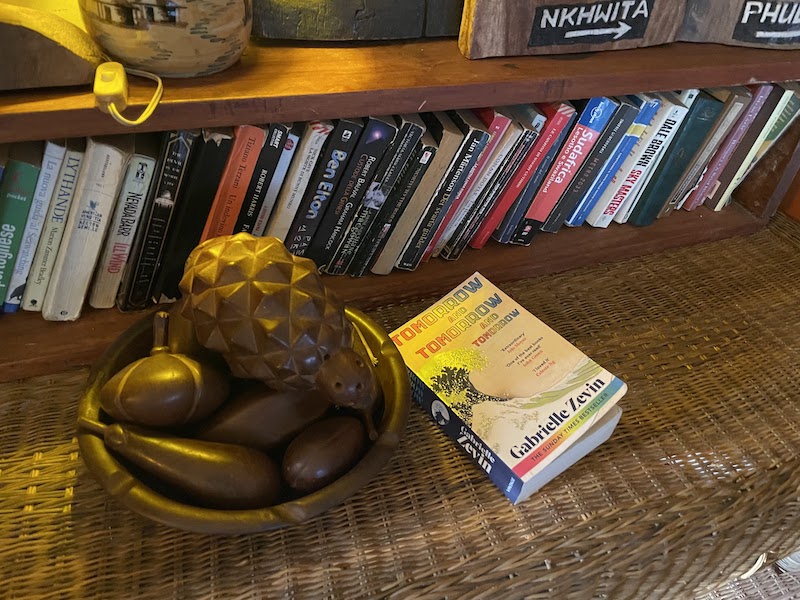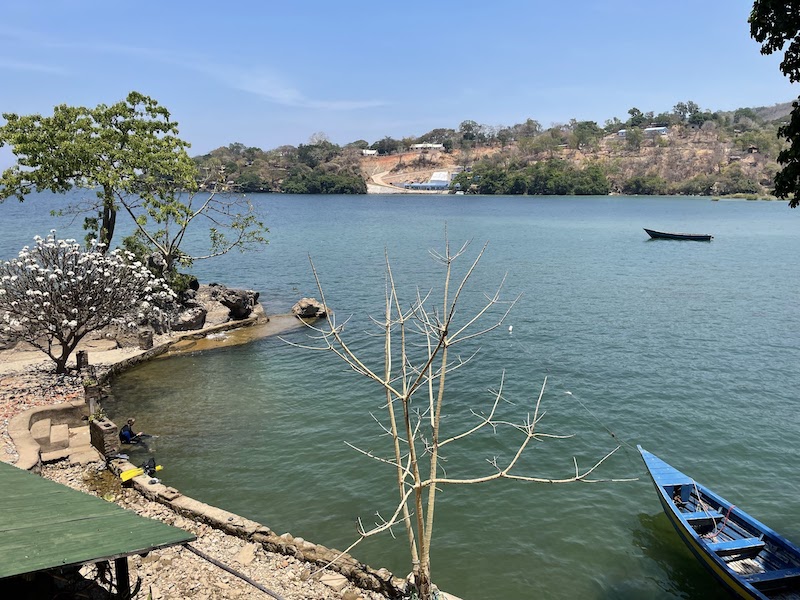In September 2023, I was reading Gabrielle Zevin's Tomorrow, and Tomorrow, and Tomorrow for the month's book club I have been organizing with my friends back in Canada for the last 12 months.
It's a story that uses digital games as an interface between human beings; throughout the book, the nerdy characters communicate through the games, grow with the games, and are helped by the games. Takeaway? Humanity is the foundation of the digital world. The book thoroughly illustrated the point by connecting the characters' attitudes to games with something more realistic, such as money, reputation, despair, hope, friendship, and love. As a millennial born and raised in Japan, who spent most of his teenage days playing video/computer games, and pursued a career in tech after being attracted by such digital content, the book instantly became special to me.
 * Although I read the audiobook version, I coincidentally found a printed copy of the book at an Italian-owned restaurant in my neighborhood in Malawi.
* Although I read the audiobook version, I coincidentally found a printed copy of the book at an Italian-owned restaurant in my neighborhood in Malawi.
Are we happy (without digital games)?
Putting the story aside, what strikes me the most is the fact that I was reading and thinking about digital games while living in Malawi, where digital technologies and infrastructure are still immature. As far as I see, nobody plays or talks about the games that changed my life due to the strong limitations to internet accessibility and data bundle. That is, Malawians seem to have fewer chances to enjoy digital games and the tangible impacts I experienced. Even though I sometimes see people playing simple puzzle-like smartphone games, it'll hardly become a life-changing encounter with the technologies, in my opinion.
Yet, we must not conclude that Malawians have less entertainment than the populations in the developed nations. On the contrary, they would be better at entertaining themselves with the limited infrastructure, and the population would be happier in the end. This is very true at least for me; even though I have less access to digital content (videos, music, books, games), I am more satisfied with my daily life than I used to be over the last few years.
Less is more. The feeling reminds me of the quiet and peaceful moment I had during the week-long remote kayaking trip on the west coast of Vancouver Island in 2022. I feel stronger connections to people, nature, and myself under the "extreme" conditions. As of writing, my body and mind are linked by the strongest tie ever.
How humans authentically entertain themselves
For a long period, people creatively play in their environment. In Tomorrow, and Tomorrow, and Tomorrow, for example, one of the main characters brought up Go as an example of an old-fashioned game humans have developed. Without having access to computers and the internet, people entertain themselves with boards and stones. Eventually, I'd imagine that humans have communicated, grown, and helped each other through playing Go, ever since the game was invented.
In Malawi, there is a classic board game called Bawo. Regardless of the availability of digital technologies, people know how to spend good time with whatever they physically have.
 * Bawo board and stones. The game usually begins by placing two stones in each of the circles. I still don't fully get the rule though.
* Bawo board and stones. The game usually begins by placing two stones in each of the circles. I still don't fully get the rule though.
Or, we can also play with the earth. In addition to stereotypical African activities such as safari, we can walk, run, hike, and swim in the beautiful country. You won't get bored even if the electricity completely goes down for a whole day during the weekend.
 * Lake Malawi, for example, offers a lot of activity options such as snorkeling and paddling. I recently got my PADI Open Water scuba diving license from Aqua Africa.
* Lake Malawi, for example, offers a lot of activity options such as snorkeling and paddling. I recently got my PADI Open Water scuba diving license from Aqua Africa.
Seeking the right source of joy, satisfaction, and happiness
Overall, my Malawian friends generally look happier and more satisfied (are more enjoying their life, in other words) than those whom I used to interact with, including myself. Here, I keep questioning what happiness means in our life. Of course, what developed nations offer is usually safer, healthier, tastier, and "better" overall. However, I'm not sure whether I was happier and more satisfied when I was in an environment, such as in Canada and Japan.
Now, I have a hypothesis: The more civilized our life is, the harder we feel a sense of satisfaction. Civilization here particularly means the implementation of technologies.
Recently, Starlink launched its network service in Malawi. On the one hand, this is great news, and wider network coverage in the rural-centered country can address a lot of development challenges we are facing. I, fortunately, had a chance to try their Wi-Fi service at a lodge where I stayed recently, and I was very impressed by how easy the setup is, how affordable the running cost is, and how fast the network is. However, at the same time, I am concerned about how such a rapid increase in internet penetration might hurt an individual's sense of happiness.
If technology was used without placing humanity as its core, what could be the point? The story of Tomorrow, and Tomorrow, and Tomorrow would become shockingly tasteless if that was the case. Therefore, we must be our authentic selves while knowing the right source of joy, satisfaction, and happiness. To be happy, we won't need the "growth" people are talking about in the Western capitalist context, and the availability of technological solutions is not a must requirement after all.
This article is part of the series: Digital Malawi: Developing Hope in the Information AgeSupport
Gift a cup of coffeeShare
Categories
See also
- 2024-01-31
- Relativize Malawi, and Rethink Their Contexts
- 2023-09-08
- Definition, Role, and Current Status of Digital Literacy in Malawi #LiteracyDay
- 2023-08-23
- Starting Field Study on How Information Flows in Malawi
Last updated: 2023-10-30
Author: Takuya Kitazawa
I am an independent consultant, mentor, and advocate for sustainable technology development with a decade of experience in AI/ML products, data systems, and digital transformation. Based in Canada and originally from Japan, I have lived and worked globally, including part-time residence in Malawi, Africa. See CV for more information, or contact at [email protected].
NowDisclaimer
- Opinions are my own and do not represent the views of organizations I am/was belonging to.
- I am doing my best to ensure the accuracy and fair use of the information. However, there might be some errors, outdated information, or biased subjective statements because the main purpose of this blog is to jot down my personal thoughts as soon as possible before conducting an extensive investigation. Visitors understand the limitations and rely on any information at their own risk.
- That said, if there is any issue with the content, please contact me so I can take the necessary action.